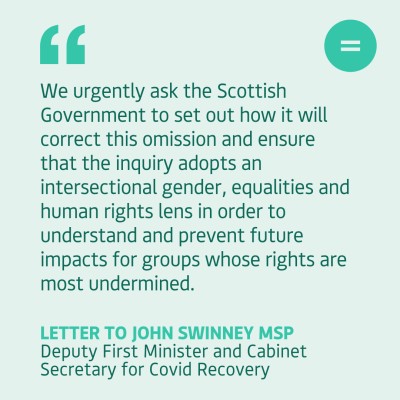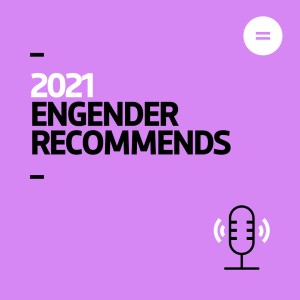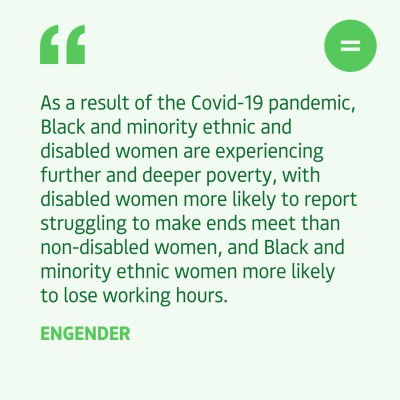Engender blog
All of Engender’s latest news. Reports, reviews, books, articles, and information from across Scotland’s women’s sector.
We would love to hear from other feminists around Scotland. Check out our guidelines for more information on how you can blog for us.
Engender joins other orgnisations dismayed at exclusion of equality and rights in Scottish Government’s Covid-19 inquiry
 Today, we joined with 26 organisations working for equality and human rights in Scotland to write to John Swinney expressing our “dismay” and “deep concerns” following the publication of the Scottish Government’s Terms of Reference for a public inquiry into the handling of the COVID-19 pandemic in Scotland.
Today, we joined with 26 organisations working for equality and human rights in Scotland to write to John Swinney expressing our “dismay” and “deep concerns” following the publication of the Scottish Government’s Terms of Reference for a public inquiry into the handling of the COVID-19 pandemic in Scotland.
Despite clear evidence raised by equalities groups and by Government itself that that the pandemic has had a greater impact on certain groups of people, the Terms of Reference as published make no reference to equality or human rights impacts stemming from the pandemic. Throughout the document, there is no mention of women, Black and minority ethnic communities, disabled people, LGBT+ People, older people, young people persons subject to No Recourse to Public Funds, and other groups who experienced the brunt of the pandemic.
Eilidh Dickson Engender's Policy and Parliamentary Manager, said:
“Since March 2020 women have been experiencing poorer physical and mental health, increased levels of unpaid work, loss of paid work, greater reliance on state support, insecure housing, and increased levels of gender-based violence. Women who are further marginalised because they are part of other oppressed groups, such as women of colour, LB+ and trans women, single mothers, disabled women and primary and secondary carers, have been exposed to even more acute poverty, violence, and exclusion.
For the Scottish Government to have ignored all of this in their Terms of Reference for the Covid-19 inquiry is disappointing, and presents real concerns about the success of the inquiry if it is falling at this first hurdle”
Engender Recommends 2021

This year we've had the pleasure of talking to some brilliant people for our On the Engender podcast, and we ask each of the guests for a recommendation at the end of the episode. There have been loads of great reading recommendations this year, plus things to watch and listen to, and some bonus animal content!
Here's what's been recommended in 2021:
Delivering Equally Safe - how can we prevent violence against women?
Engender have been awarded funding from the Delivering Equally Safe fund of the Scottish Government, for work on primary prevention of violence against women. In this blog, we explain why this is so vital, and how those interested can complete our Invitation to Tender.
Women’s inequality is both a cause and consequence of violence against women, and therefore eradicating violence against women in Scotland will require us to tackle entrenched gender inequalities.
In the last twenty years of devolution, we have seen representatives from the violence against women movements making change happen in the Parliament, in Scottish Government, and in our public bodies. We have seen decision-makers who share our values, and our sense of outrage that so many women have their space for action reduced by men’s violence, advocating hard for violence against women prevention and services. But yet we still see endemic levels of violence against women in Scotland.
Equally Safe, Scotland’s violence against women strategy, entrenches a feminist analysis of men’s violence. It is one of few such strategies around the world to link women’s equality and violence against women, and along with Scotland's Domestic Abuse Act, has rightly been hailed as world-leading for its boldness of analysis. That boldness must now be matched with boldness of action, and that's one of the reasons we are so pleased to be undertaking this key research around primary prevention.
Emma Ritch awarded lifetime achievement award
Last night Engender's late Executive Director, Emma Ritch, was posthumously awarded the Lifetime Achievement Award at the Scottish Public Services Award 2021.
Nina Murray, the convener of Engender's board, accepted the award. Her speech honouring Emma is shared here.
Exploring the impact of Covid-19 on women's equality in Scotland

Over the past eighteen months, we’ve seen how the inequalities that existed before Covid-19 have been magnified and intensified by the pandemic. Covid-19 has disproportionately impacted women both at work and at home, with UN Women estimating that the impact for women’s equality could mean a rollback of 25 years of progress on women’s rights.
Women in Scotland face a reduction in paid work both due to increased caring responsibilities and being concentrated in industries hardest hit by the pandemic like hospitality and nursing, which also places women at increased risk of exposure to Covid-19. There is a widening gender gap in unpaid work as women are expected to pick up the slack created by widespread reduction in social care packages, made even more difficult by the persistent inadequacy of social security provision, which has been further compounded by the recent £20 cut in Universal Credit.
Throughout the past year, we’ve joined with organisations across the 4 nations of the UK including Close the Gap, the UK Women’s Budget Group, the Fawcett Society, Women’s Equality Network Wales and the Northern Ireland Women’s Budget Group in a polling project to collect survey data on the impact of Covid-19 on women, funded by the Standard Life Foundation and the Joseph Rowntree Reform Trust. We’ve also worked with Close the Gap to produce joint reports highlighting what this data tells us about the impact of Covid-19 on women in Scotland specifically.
Downloads
 Engender Briefing: Pension Credit Entitlement Changes
From 15 May 2019, new changes will be introduced which will require couples where one partner has reached state pension age and one has not (‘mixed age couples’) to claim universal credit (UC) instead of Pension Credit.
Engender Briefing: Pension Credit Entitlement Changes
From 15 May 2019, new changes will be introduced which will require couples where one partner has reached state pension age and one has not (‘mixed age couples’) to claim universal credit (UC) instead of Pension Credit.
 Engender Parliamentary Briefing: Condemnation of Misogyny, Racism, Harassment and Sexism
Engender welcomes this Scottish Parliament Debate on Condemnation of Misogyny, Racism, Harassment and Sexism and the opportunity to raise awareness of the ways in which women in Scotland’s inequality contributes to gender-based violence.
Engender Parliamentary Briefing: Condemnation of Misogyny, Racism, Harassment and Sexism
Engender welcomes this Scottish Parliament Debate on Condemnation of Misogyny, Racism, Harassment and Sexism and the opportunity to raise awareness of the ways in which women in Scotland’s inequality contributes to gender-based violence.
 Gender Matters in Social Security: Individual Payments of Universal Credit
A paper calling on the Scottish Government to automatically split payments of Universal Credit between couples, once this power is devolved to the Scottish Parliament.
Gender Matters in Social Security: Individual Payments of Universal Credit
A paper calling on the Scottish Government to automatically split payments of Universal Credit between couples, once this power is devolved to the Scottish Parliament.
 Gender Matters Manifesto: Twenty for 2016
This manifesto sets out measures that, with political will, can be taken over the next parliamentary term in pursuit of these goals.
Gender Matters Manifesto: Twenty for 2016
This manifesto sets out measures that, with political will, can be taken over the next parliamentary term in pursuit of these goals.
 Scottish NGO Briefing for UN Special Rapporteur on Violence Against Women
Joint briefing paper for the UN Rapporteur on Violence Against Women.
Scottish NGO Briefing for UN Special Rapporteur on Violence Against Women
Joint briefing paper for the UN Rapporteur on Violence Against Women.

Newsletter
Sign up to receive our newsletter here:
Sign up to our mailing list
Receive key feminist updates direct to your inbox: